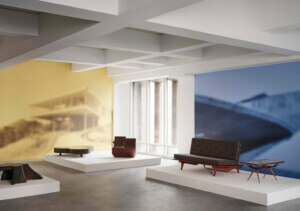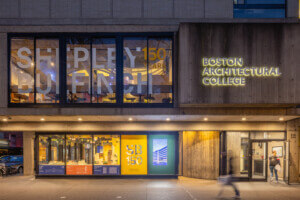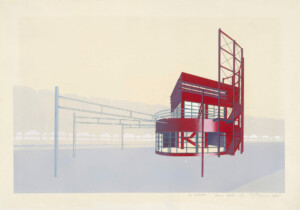As of Monday, it appears that the Vkhutemas show, previously delayed due to concerns about the appearance of supporting Soviet pedagogy in the midst of Russia’s aggression in Ukraine, will move forward. The Cooper Union has indicated it will continue with the show, which will be “supported by additional contextualizing material that will provide different frameworks for understanding these issues and the exhibition’s original pedagogical research and intent.”
The school will also conduct sessions with students and host a public roundtable “to unpack the multidimensional issues relating to the exhibition and its presentation—including the importance of uncovering a history lost to political suppression and an exploration of how histories can be instrumentalized for political gain today.”
An opening date for this exhibition of student work has not been released. A new date for cocurator Anna Bokov’s conversation with Jean-Louis Cohen, originally scheduled to take place this evening, has not been provided.
Coverage of this incident continues to unearth more information about the timeline of events that led to the show’s postponement. Writing in Curbed, Diana Budds reported that “after publishing the article, Anker shared it on Facebook, stating that he had written it ‘in support of the Ukrainians of New York’ and tagging a public Facebook group with nearly 3,000 members, who then flooded the Cooper Union’s Facebook page with angry comments echoing Anker.” Olivia Crough, an art historian involved with the Vkhutemas show, told Budds that “when the New Museum, which is just eight blocks away from the Cooper Union, exhibited a library of Russian literature in its recent Theaster Gates exhibition, there were no calls to cancel that show.”
According to Budds’s reporting, Anker said the article wasn’t a personal attack, but was inspired by an encounter with an angry Ukrainian person while “in line at a coffee cart he regularly visits in Astor Place.” But there was coordination with Mitchell Joachim, cofounder of Terreform ONE, the nonprofit where Bokov was previously employed, Anker is an ongoing collaborator, and Nina Edwards Anker is a design director. According to an email reviewed by AN, on Friday, January 20, one day before the publication of Anker’s op-ed on Archinect, Joachim forwarded a draft of the text to a list of unspecified recipients. The intent was to “confront” The Cooper Union about the “show on Russian Soviet Architecture.” He used pronouns that linked himself to the efforts of the text’s author. “We wish to have the unfiltered opinion and comments of Ukrainian designers and architects working today. Please write and let us know what you think,” Joachim wrote.
While the controversy about this exhibition of student research continues, it takes place within the larger narrative of the ongoing war and the resulting proliferation of anti-Russian sentiment. If this latest update about the Vkhutemas exhibition holds, it appears that it may be possible to showcase the work of students at The Cooper Union while elevating the voices of living Ukrainians and engaging the history of an important (and short-lived) design school.
The statement from The Cooper Union reads in full:
On January 25, The Cooper Union made the difficult decision to provisionally postpone the opening of Vkhutemas: Laboratory of the Avant-Garde, 1920-1930, an exhibition organized by The Irwin S. Chanin School of Architecture and co-curated by Anna Bokov and Steven Hillyer, scheduled to open later that day. The exhibition grew out of two seminars and a workshop led by Assistant Professor Adjunct Bokov, starting in 2019, that explored the legacy and learnings of a little-known design school that was shut down by Stalin in the 1930s for its progressive ideas.
The Cooper Union fielded questions, both privately and publicly, when the exhibition was first announced in early January, with individuals expressing anger over what was perceived as a celebration of Russia’s contribution to architecture and the timing in light of Russia’s ongoing brutal invasion of Ukraine. The groundswell of uncertainty and distress that occurred in advance of the public opening made it clear that more time was needed to listen and assess before moving forward with this presentation.
As a result, over the past two weeks, President Laura Sparks, Acting Dean Hayley Eber, and Exhibitions Committee Chair Alexander Tochilovsky have conducted a series of individual and group discussions with the exhibition’s co-curators, the students who contributed work to the exhibition, the School of Architecture Faculty, and Ukrainian members of The Cooper Union community. Leadership also carefully reviewed letters and fielded outreach from colleagues, peers, and individuals from throughout our community. These conversations have been important and instructive, and have underscored both the significance of this exhibition and the need to frame this work within the broader geopolitical context, both then and now.
At its core, The Cooper Union has always been a forum for public discourse and dialogue addressing the challenges and opportunities of our time. The School of Architecture encourages students to investigate the role of the architect and the societal, environmental, and political implications of their work and, in doing so, reinforces the notion that design and building are not just the end point of set ideas, but can often themselves prompt constructive debate and critical discourse.
It is in this spirit that, together with the exhibition’s co-curators, The Cooper Union will open the exhibition later this spring, supported by additional contextualizing material that will provide different frameworks for understanding these issues and the exhibition’s original pedagogical research and intent. The School will also host a series of sessions with Cooper Union students as well as a public roundtable in conjunction with the exhibition’s opening to unpack the multidimensional issues relating to the exhibition and its presentation—including the importance of uncovering a history lost to political suppression and an exploration of how histories can be instrumentalized for political gain today. Details and dates will be shared in the coming weeks as they are finalized.
Thank you to all those who have offered constructive feedback, engaged in critical discourse, and offered suggestions as the School has crafted an approach for moving forward.
AN will follow up when the date of the show’s opening is announced.











